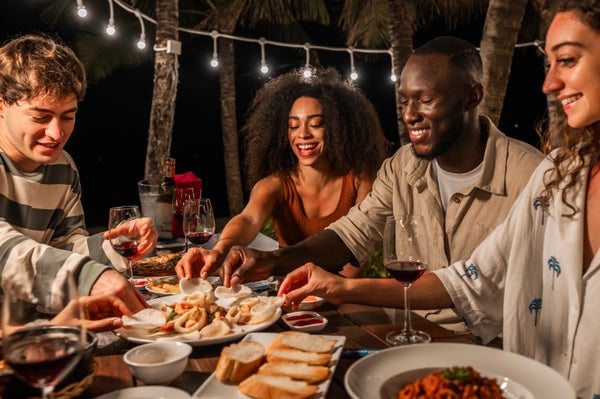November 27, 2024
Thank you for reading this post, don't forget to subscribe!3 min read
Analysis of nearly 2,000 people living in remote villages in Honduras reveals who’s spreading gut microorganisms to whom
By Saima Sidik & Nature magazine

Friends share more than just food when they dine together.
ljubaphoto/Getty Images
A shared meal, a kiss on the cheek: these social acts bring people together — and bring their microbiomes together, too. The more people interact, the more similar the make-up of their gut microorganisms is, even if individuals don’t live in the same household, a study shows.
The study also found that a person’s microbiome is shaped not only by their social contacts but also by the social contacts’ connections. The work is one of several studies that raise the possibility that health conditions can be shaped by the transmission of the microbiome between individuals, not just by diet and other environmental factors that affect gut flora.
In the quest to understand what shapes a person’s microbiome, social interactions are “definitely a piece of the puzzle that I think has been missing until recently”, says microbiologist Catherine Robinson at the University of Oregon in Eugene, who was not involved in the work.
On supporting science journalism
If you’re enjoying this article, consider supporting our award-winning journalism by subscribing. By purchasing a subscription you are helping to ensure the future of impactful stories about the discoveries and ideas shaping our world today.
The research was published in Nature on 20 November.
What’s mine is yours
The study has its roots in research published almost 20 years ago that investigated how obesity spreads in social networks. Certain viruses and bacteria found in the gut microbiome are known to change a person’s risk of obesity, and social scientist Nicholas Christakis wondered whether friends pass these microbes to each other in addition to influencing each other’s eating habits. “This was a kernel of an idea that I just couldn’t let go,” says Christakis, who is based at Yale University in New Haven, Connecticut.
Since then, several publications have suggested that social interactions shape the gut microbiome. Christakis and his colleagues travelled to the jungles of Honduras to add to this emerging literature. There, they mapped the social relationships and analysed microbiomes of people living in 18 isolated villages, where interactions are mainly face to face and people have minimal exposure to processed foods and antibiotics, which can alter the composition of the microbiome.
“This was an enormous undertaking,” Christakis says, because the team had to set up shop in a remote location, then get the samples back to the United States for processing.
Spouses and individuals living in the same house share up to 13.9% of the microbial strains in their guts, but even people who don’t share a roof but habitually spend free time together share 10%, the researchers found. By contrast, people who live in the same village but who don’t tend to spend time together share only 4%. There is also evidence of transmission chains — friends of friends share more strains than would be expected by chance.
The results add depth to scientists’ understanding of what shapes the microbiome, partly because the team looked at subspecies of the gut microbes, says microbiologist Mireia Valles-Colomer at Pompeu Fabra University in Barcelona, Spain, who was not involved in the work. Social contacts might share the same microbial species by chance, but they’re much less likely to share the same strains unless they’ve passed them to each other.
Rethinking transmissibility
Research like this “is changing completely the way we think”, because it suggests that risk factors for conditions with links to the microbiome, such as hypertension and depression, could spread from person to person through their microbiomes, says computational biologist Nicola Segata at the University of Trento in Italy. Segata was not involved in the current work, but he has worked with Valles-Colomer and members of Christakis’s team in the past on similar research.
In the case of depression, which can be difficult to treat, combining existing therapies with microbiome-targeting treatments might improve care, says Valles-Colomer.
But people should not avoid social interactions for fear of “catching” others’ microbiomes. Social interactions can spread components of healthy microbiomes and have myriad other benefits. Valles-Colomer says, “Close contacts are not bad for us. The opposite — they are beneficial!”
This article is reproduced with permission and was first published on November 20, 2024.

